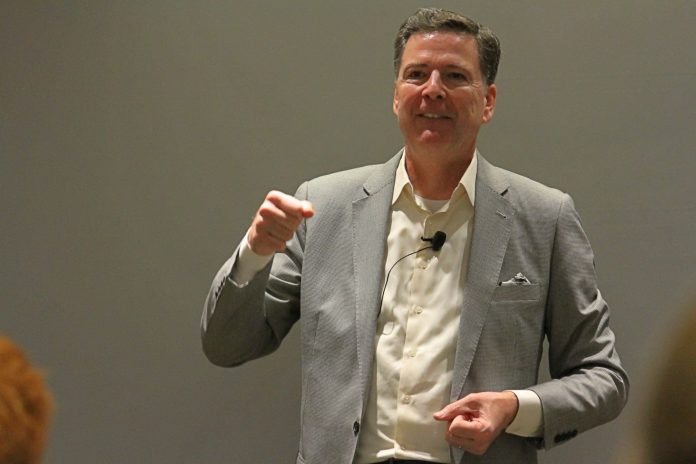Friday, March 15, James Comey ’82 returned to campus for a talk about integrity and politics. Surrounded by government majors sitting throughout the rows of Tucker Theater, Comey discussed his experiences as United States Deputy Attorney General and Director of the FBI before answering questions from students.
Comey opened with a story about his time as deputy attorney general that featured an ethical dilemma he faced regarding a National Security Agency surveillance program called “Stellar Wind.”
“I had never heard of Stellar Wind [and] didn’t know anything about it,” Comey said. “It involved the NSA conducting surveillance in the United States for counter-terrorism purposes, which was extraordinarily unusual, and conducting that surveillance in an unusual way that was really problematic.”
“I had never heard of Stellar Wind [and] didn’t know anything about it,” Comey said. “It involved the NSA conducting surveillance in the United States for counter-terrorism purposes, which was extraordinarily unusual, and conducting that surveillance in an unusual way that was really problematic.”
Comey went on to explain that the program, sponsored by former President George W. Bush, was sponsoring surveillance actions without the president’s knowledge, which violated a statute of Congress. The program was due for renewal and the White House renewed the program without the consent of the attorney general. Comey and Attorney Robert Mueller decided to quit if the program continued its illegal actions, putting themselves on the line to prevent the Justice Department from authorizing an illegal program. Their strategy worked and the program was reshaped to fit within existing legal guidelines. Comey said that his decision in the moment originated from his judgment abilities.
“It really helped me to close my eyes and say, ‘Ok, what could be said about this three years from now? What will be said about this in Congress, in the media, in academia?” Comey said. “… How will it be thought about in different places and times?’ Take this crisis and move it around. In my mind, that’s judgment. Judgment is the ability to inspect a thing from different angles, and especially from different places in time, and see it as others could see it.”
In the subsequent session, Comey touched on some of his recent judgments, including his decision to announce that the FBI was reopening the case of Hillary Clinton’s emails less than two weeks before the 2016 election. Comey explained his actions as a tough choice between two bad options: he could either speak about the investigation or conceal it from Congress and the American public.
“Speaking would suck, because it might have an impact on the election of the president of the United States, that’s the last thing on Earth we want to do,” Comey said. “But what about that other thing? Concealing, in our judgment, would cause catastrophic damage to the institutions of justice, at least for the rest of our lives, probably forever,” Comey said. “Which should we choose, something that sucks, or something that’s catastrophic? It’s not that hard, actually. We gotta do the suck thing.”
Some students who attended the talk shifted their perspectives on Comey’s actions regarding the investigation into Hillary Clinton.
“I was on the side of like, ok, maybe he did something wrong. But after listening to him, I understood. He was in a really tough position,” Erin McClain ‘22 said.
“I was on the side of like, ok, maybe he did something wrong. But after listening to him, I understood. He was in a really tough position,” Erin McClain ’22 said. “It was nice to see that there are people working in the government, for the government, that have integrity and have morals and are catering to what’s best for the American people.”
Other students were encouraged by Comey’s tough decision on the Clinton investigation.
“Hearing his thought process and how he had two choices that both were difficult was really good to hear and also made me feel more confident in our government — that there are people in the system who are doing it for the right reasons and are apolitical in the Department of Justice,” Sophia Moustaid ’22 said.
Comey also discussed the current political climate in the United States under President Donald Trump, saying that he is optimistic about the future despite Trump’s negative impacts on domestic politics.
“I describe in my book that Donald Trump is a forest fire,” Comey said. “I chose forest fire because he is doing great damage, short-term damage, to the truth most importantly. I don’t care whether you’re a Republican or Democrat, it’s not ok for the president to be a chronic liar. But I chose forest fire because, in the wake of a forest fire, amazing things grow that could not grow before. The old, boring trees were soaking up the water and the air and the light, I feel that already. I know the history of this country; I’ve seen us before and what forces us upward again is that the values of this country are too strong to be screwed up by any one leader.”
“I know the history of this country; I’ve seen us before and what forces us upward again is that the values of this country are too strong to be screwed up by any one leader.” Comey said.
Students like Selene Swanson ‘22 found Comey’s optimism heartening.
“I thought it was really good how he talked about how America has its ups and downs, and it does give me a lot of hope,” Swanson said. “It’s good to hear it from someone who’s been up close and personal and involved in that, because it’s easy to be optimistic when you don’t know how the sausage gets made, but the fact that even James Comey can be optimistic, makes me optimistic.”

